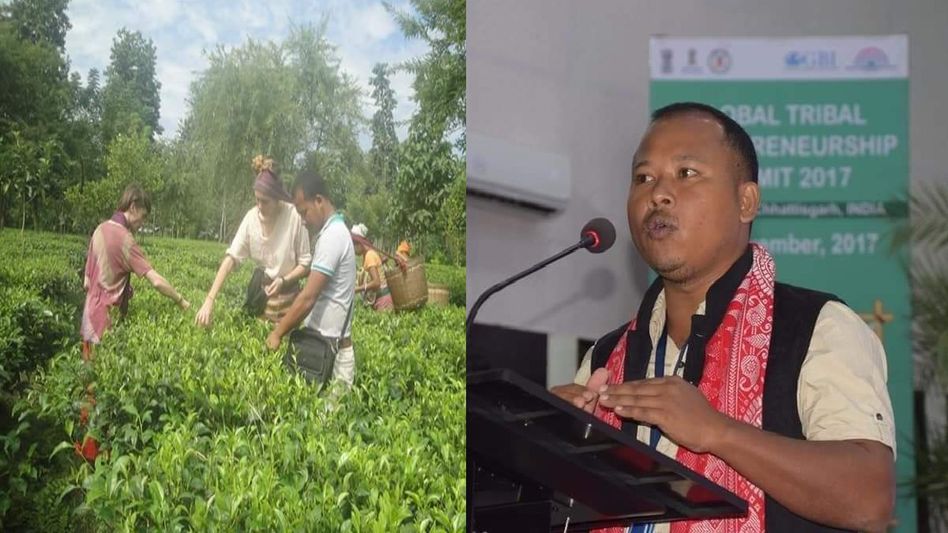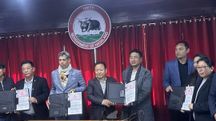Assam's pioneer in organic tea farming: The inspiring journey of Tenzing Bodosa
Tenzing Bodosa, hailing from Kachibari village in Assam’s Udalguri district, is renowned as the state’s first organic tea farmer. His pioneering efforts have spearheaded a revolution in organic tea farming across North-East India. With deep agricultural roots, Bodosa manages two farms spanning approximately 250 bighas in the Bodoland Territorial Region, both recognized globally as the first elephant-friendly farms.

Tenzing Bodosa, hailing from Kachibari village in Assam’s Udalguri district, is renowned as the state’s first organic tea farmer. His pioneering efforts have spearheaded a revolution in organic tea farming across North-East India. With deep agricultural roots, Bodosa manages two farms spanning approximately 250 bighas in the Bodoland Territorial Region, both recognized globally as the first elephant-friendly farms.
Tenzing’s early life was marked by tragedy when, at the age of ten, the Bodoland Movement's violence claimed seven of his family members. To ensure his safety, his mother sent him to Guwahati, sacrificing their small plot of land. Despite his young age and being in the sixth standard, Tenzing embarked on a journey of survival, taking on multiple jobs, from gardening and construction to driving, and later exploring oil mining and catering in Meghalaya.
After 13 years away, Tenzing returned to his roots in 2006, driven by a desire to reconnect with his mother and his homeland. He started a tea plantation, but soon encountered an environmental challenge—water from his tube well, used for washing clothes, was contaminating a nearby pond, harming the fish. This realization prompted him to embrace organic farming, inspired by ancestral practices. With no local expertise, he sought assistance from Canadian NGOs like Greenpeace and Fertile Ground, inviting them to his farm for training.
His farm’s unique feature is its integration with the surrounding jungle, intentionally left unfenced to allow free movement for migrating elephants from the Bhutan mountains. Tenzing has planted bamboo and bananas to provide food for these wild visitors, embodying his philosophy: "Why should I only grow food for myself? I should also grow for the wild elephants so that whenever they visit my farm, they can eat that food."
The World Wildlife Fund (WWF) team has consistently visited his farm over three years, and Lisa Klimek Mills, founder of Elephant Origins Tea, certified it as the world's first elephant-friendly farm. Since 2007, Tenzing has dedicated himself to organic tea farming, gaining 17 years of experience in producing high-quality, chemical-free tea. He employs a self-sufficient approach, creating natural fertilizers from locally sourced materials like neem leaves, cow dung, and poultry manure, which also serve as potent, chemical-free pest control solutions.
Tenzing’s influence extends globally, having trained around 200,000 tea farmers worldwide in organic farming techniques. His farm is a training ground for those interested in organic tea cultivation and natural manure production. He provides stable employment for about 30 permanent staff members and hires an additional 50-80 seasonal workers as needed.
For 15 years, Tenzing’s tea products have reached international markets in 18 countries, including Canada, the UK, France, Germany, and New York City. Domestically, his organic tea is available in markets across Delhi, Gujarat, and various parts of North-East India.
In response to directives from the Tea Board of India and the Food Safety and Standards Authority of India (FSSAI) on pesticide use, Tenzing emphasizes the detrimental effects of pesticides on the environment, human health, tea quality, and biodiversity. He advocates for organic farming as a sustainable alternative, promoting ecological balance and contributing to a more environment-friendly tea industry.
Tenzing also proposes the establishment of small-scale trading hubs and training facilities to empower local business owners, fostering economic resilience and growth. His farm attracts international tourists, including tea enthusiasts and wildlife lovers, promoting a deep connection with nature and ecological sustainability.
Copyright©2025 Living Media India Limited. For reprint rights: Syndications Today









